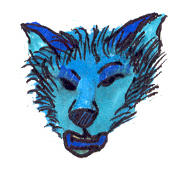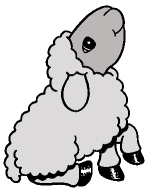8/11/2005
You have to ask the sheep who's the wolf

 It's now time for a complex topic: justice. Since it's a central topic in Levinas' work I will write about it more often. And also, which is maybe even more important, because justice is one of the values that I find the most important in the world, together with freedom and love.
It's now time for a complex topic: justice. Since it's a central topic in Levinas' work I will write about it more often. And also, which is maybe even more important, because justice is one of the values that I find the most important in the world, together with freedom and love.As a child I went to the Kritische Gemeente IJmond, a church near where I lived. It was a modern and critical church where justice was considered important. The church often helped e.g. refugees or organised discussions about political themes. There was a KGIJ year calender with international sayings. There is one I read as a child and which I always remembered: You have to ask the sheep who is the wolf. It took a long time before I understood what it meant. You have to ask the people who suffer and who are oppressed who is doing harm to them.
I wrote my views about this in Orkut. It's a very complex saying, which was shown by the many reactions I got of people who didn't understand it the way I meant it. There was even a fascist who started to talk about the strenght of the race of wolves.
But this saying is really useful to think about justice. It's also special that there is a subjective perspective in it, but also an objective aspect. To know the truth you must ask certain people, others not. People who have experienced oppression know what it is like, while oppressors will never admit what they are doing. The subjective perspective of the victims is at the same time objective, becuase it points at oppression, a phenomenon which is taking place in reality.
The problem with the use of different types of animals is that it seems to refer to race. But this is absolutely not what I mean. Any person can be an oppressor at one moment in history and become a sheep later. These are roles that change all the time. Of course there is an inequality at the global level which makes that some groups of people are wolves generation after generation and others sheep. But there are always individual differences. So it is still very important to make a good reliable analysis of who is oppressing whom, instead of making simple generalisations in black and white. It can even be that two groups are oppressing each other at the same time.
It's also important not to be lead by irrational emotions. You start to care so much for the sheep who got hurt, that you love the sheep and you hate the wolf unconditionally, and then you don't really look anymore at what is happening, if maybe the roles are changing between the sheep and the wolf.
Still it's a strong saying, because oppression and injustice is not something that people make up themselves, which doesn't exist in reality. There is no universal concept of justice but there is some universality in extreme injustice. And if I try to look for injustice and if I find it, then I can try to fight it. I can try to improve the world and to make it more just according to my own values (only on a very small scale of course, but that doesn't matter). My values will be universal at least partly, because it's my universal human conscience which tells me the difference between what is just and what not.
So here's the text I wrote at Orkut: You have to ask the sheep who the wolf is
Comments:
<< Home
Nice picture of Sheep and wolf there Es :)
But the explainatin you gave there was just simply perfect...
Post a Comment
But the explainatin you gave there was just simply perfect...
<< Home
